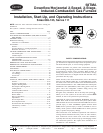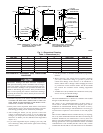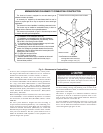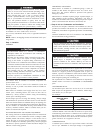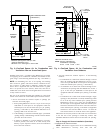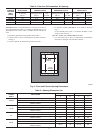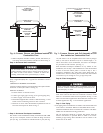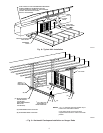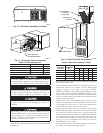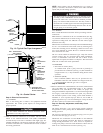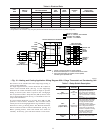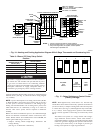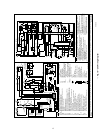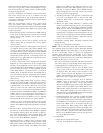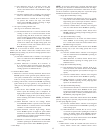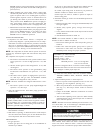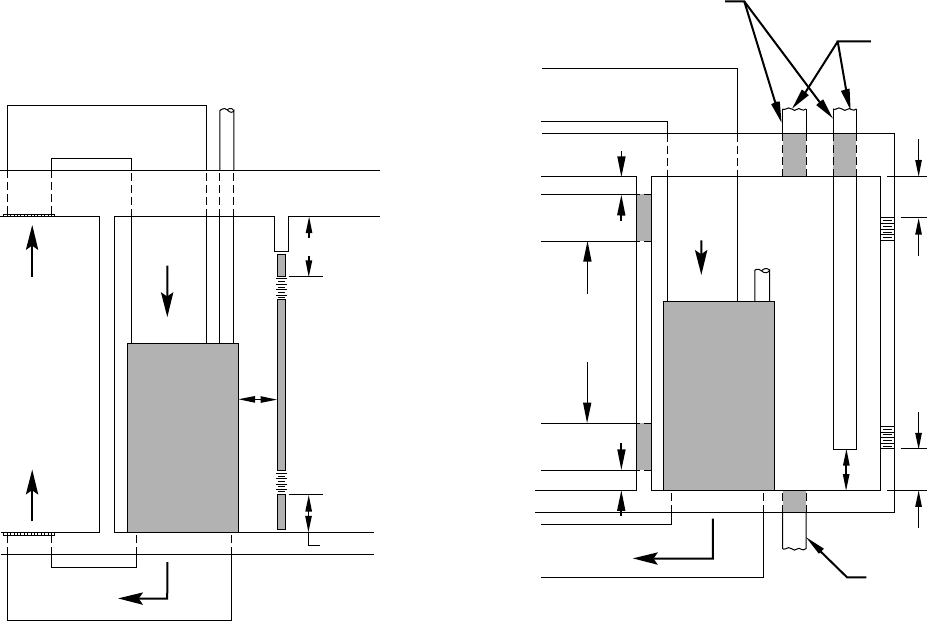
installed in that space. A confined space MUST have provisions
for supplying air for combustion, ventilation, and dilution of flue
gases using 1 of the following methods. (See Fig. 3 and Table 2.)
NOTE: In determining free area of an opening, the blocking
effect of louvers, grilles, and screens must be considered. If free
area of louver or grille design is unknown, assume that wood
louvers have a 20 percent free area and metal louvers or grilles
have a 60 percent free area. Screens, when used, must not be
smaller than 1/4-in. mesh. Louvers and grilles must be constructed
so they cannot be closed.
The size of the openings depends upon whether air comes from
outside of the structure or an unconfined space inside the structure.
1. All air from inside the structure requires 2 openings (for
structures not usually tight):
a. Each opening MUST have at least 1 sq in. of free area per
1000 Btuh of total input for all equipment within the
confined space, but not less than 100 sq in. per opening.
(See Fig. 3 and Table 2.) The minimum dimension of air
openings shall not be less than 3 in.
b. If the building is constructed unusually tight, a permanent
opening directly communicating with the outdoors shall be
provided. See item 2 below.
c. If furnace is installed on a raised platform to provide a
return-air plenum, and return air is taken directly from
hallway or space adjacent to furnace, all air for combustion
must come from outdoors.
2. Air from outside the structure requires 1 of the following
methods:
a. If combustion air is taken from outdoors through 2 vertical
ducts, the openings and ducts MUST have at least 1 sq in.
of free area per 4000 Btuh of total input for all equipment
within the confined space. (See Fig. 4 and Table 2.)
b. If combustion air is taken from outdoors through 2 hori-
zontal ducts, the openings and ducts MUST have at least 1
sq in. of free area per 2000 Btuh of total input for all
equipment within the confined space. (See Fig. 4 and Table
2.)
c. If combustion air is taken from outdoors through a single
opening or duct (horizontal or vertical) commencing within
12 in. of the top of the confined space, opening and duct
MUST have at least 1 sq in. of free area per 3000 Btuh of
the total input for all equipment within the confined space
and not less than the sum of the areas of all vent connectors
in the confined space. (See Fig. 4 and Table 2.) Equipment
clearances to the structure shall be at least 1 in. from the
sides and back and 6 in. from the front of the appliances.
When ducts are used, they must be of the same cross-sectional area
as the free area of the openings to which they connect. The
minimum dimension of ducts must not be less than 3 in. (See Fig.
4.)
Step 3—Supply-Air Plenum Installation (Downflow)
DOWNFLOW INSTALLATION
NOTE: This furnace is approved for use on combustible flooring
when manufacturer’s accessory floor base Part No.
Fig. 3—Confined Space: Air for Combustion and
Ventilation from an Unconfined Space
A93387
RETURN
AIR
6″ MIN
(FRONT)
†
SUPPLY AIR
VENT THROUGH ROOF
(CATEGORY I)
1 SQ IN.
PER 1000
BTUH
*
IN DOOR
OR WALL
12″ MAX
1 SQ IN.
PER 1000
BTUH
*
IN DOOR
OR WALL
12″ MAX
INTERIOR
HEATED
SPACE
* Minimum opening size is 100 sq in. with
minimum dimensions of 3 in.
†
Minimum of 3 in. when type B-1 vent is used.
UNCONFINED
SPACE
Fig. 4—Confined Space: Air for Combustion and
Ventilation from Outdoors
A93388
DUCTS TO
OUTDOORS
1 SQ IN.
PER 4000
BTUH
*
RETURN
AIR
VENT
THROUGH
ROOF
(CATEGORY I)
D
B
A
C
E
1 SQ IN.
PER 4000
BTUH
DUCT
TO
OUTDOORS
SUPPLY AIR
1 SQ IN.
PER 2000
BTUH
*
DUCTS
TO
OUTSIDE
12″ MAX
12″ MAX
CONFINED
SPACE
12″
MAX
12″
MAX
1 SQ IN.
PER 4000
BTUH
*
OUTDOORS
1 SQ IN.
PER 4000
BTUH
*
1 SQ IN.
PER 2000
BTUH
*
12″ MAX
Use any of the following
combinations of openings:
A & B C & D D & E F & G
NOTE:
*
Minimum dimensions of 3 in.
F
G
5
→



